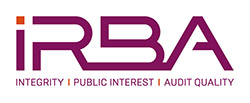IRBA Comment process yields solid engagement
| Johannesburg, Friday, January 20, 2016 - The comment process around the Independent Regulatory Board for Auditors’ (IRBA) requirement for mandatory audit firm rotation has delivered substantial engagement and at Friday afternoon in excess of 65 submissions were already received as part of the public consultation process. The IRBA confirmed that the submissions come from a diverse set of stakeholders, including civil society groups, professional bodies, listed companies, audit firms, accounting practices and State Owned Entities, as well as private individuals. It had not yet concluded processing the submissions and registrations of interested and affected parties and more were expected.
Says Bernard Agulhas, CEO: “While the board has still to review the submissions in detail, we are nevertheless pleased with the public consultation process so far. Engagement throughout the process has been robust and is in our view representative of not only primary stakeholders but also key groupings and associations, as well as the public.” A report with all submissions will be compiled and will be tabled at the February meeting of the board. Agulhas says that the IRBA, through its international relations with other audit regulators, and participation on various ethics and standards setting committees, has noted a sharp increase in reference to auditor independence concerns across the globe as well as many initiatives to improve transparency, reporting regulations and auditor independence. For example, the US-regulator, the Public Company Accounting Oversight Board (PCAOB) has proposed significant changes to its requirements for the auditor’s report which will require increased disclosure around the communication of critical audit matters arising from the audit and new elements related to auditor independence and auditor tenure. This initiative is to make the reports more meaningful to investors and financial statement users. The new audit regime for auditors in the European Union came into effect on 17 June last year and introduced mandatory audit tendering, rotation of auditors and a prohibition on most non-audit services for audit clients. Consequently, most of the 28 countries of the European Union were responding to the EU directive to have mandatory audit rotation, on its own or in combination with other measures, incorporated into local legislation by June. Towards the end of last year audit rotation was well underway in the United Kingdom with announcements of new audit appointments almost weekly as companies were gearing up to comply with the 2020 deadline. In the closing weeks of the year, Rolls Royce, Legal and General and Schroders all announced the results of their audit tender processes. In the UK, listed companies and other public interest entities are required to put their audit out to tender every 10 years, and change auditors at least every 20 years. In September, the Mauritius parliament adopted amendments that will require mandatory audit firm rotation for listed companies and banks, with limits set at seven years. Meanwhile in the same month, the Central Bank of Kenya moved to introduce three-year term limits for external auditors of the banking sector following a survey by Smart Company which revealed that the Kenyan banking industry was facing a familiarity threat due to the long tenures of auditors — some spanning over two decades. In research conducted on G20 countries and the International Forum of Independent Audit Regulators (IFIAR) member countries, in excess of 30 had or will implement MAFR following the EU directive. This excludes non-IFIAR markets such as Kenya, Nigeria and others in Africa which have already implemented the measure. IFIAR is the global forum representing 52 independent audit regulators. Mandatory audit firm rotation in South Africa is set to kick in on 1 April 2023, with the required rotation being every ten years, pending the conclusion of the current public comment process, which was designed to enable firms and companies to supply evidence of the cost and practical impact of audit firm rotation. Ends More about the IRBA: The IRBA is a public protection statutory body established to protect the financial interests of the public by ensuring registered auditors and their firms deliver services of the highest quality. It upholds audit firm independence to ensure that audit quality is such that it enhances the accuracy and credibility of financial performance reporting. In this way, the IRBA has an important role to play in building the reputation of South Africa as an investment market for both local and global investors and driving economic growth for the country. As an internationally recognised regulator of the auditing profession and other assurance services relevant to the South African environment, it has been recognised by the World Economic Forum as the top independent audit regulator worldwide for seven consecutive years for the strength of its audit controls and standards. The IRBA also registers suitably qualified accountants as auditors, who must adhere to the highest ethics standards, and promotes the auditing profession through the effective regulation of assurance conducted in accordance with internationally recognised standards and processes.
|





